Learning Analytics Workshop - Participants: Difference between revisions
From Santa Fe Institute Events Wiki
| Line 49: | Line 49: | ||
<br> | <br> | ||
[[image:Chuckpezeshki.jpg| | [[image:Chuckpezeshki.jpg|150px|{border}]] <br> | ||
'''Charles Pezeshki,''' School of MME Washington State University<br><br> | '''Charles Pezeshki,''' School of MME Washington State University<br><br> | ||
Chuck is a pioneer in experiential learning and writes about the role of social connection, relationships and empathy in design thinking, neurological development, knowledge construction and information coherence. His blog/latest book is: http://empathy.guru/readers-guide | Chuck is a pioneer in experiential learning and writes about the role of social connection, relationships and empathy in design thinking, neurological development, knowledge construction and information coherence. His blog/latest book is: http://empathy.guru/readers-guide | ||
Revision as of 23:16, 25 October 2016
| Working Group Navigation |
Microsoft Participants

Alicia Boaz, Microsoft
Alicia currently works at Microsoft as a Senior Business Strategy Analyst within the Learning Experiences team that offers modern learning experiences for IT professionals, Developers, and Students to gain new technology skills.

Chris Roy, Senior Director of Learning Services for Microsoft Corporation.
Chris has spent the last 25 years in the education industry and uses that experience as in his position as the Senior Director of Learning Services for Microsoft Corporation. He is responsible for the global learning strategy for commercial and academic readiness. Chris and his team focuses on innovation in learning and is driving transformation change across Microsoft learning groups. Prior to his current role, Chris was New Horizons United President of Sales since 2010, a position he choose upon the sale of his business, United Training. Chris was the President and CEO of United Training, a technical training consortium for over 10 years. He was the original founder of United Training which was based on an initial concept developed to support enterprise accounts in Massachusetts. Under his leadership, United Training grew its membership to well over 65+ physical locations throughout North America, and struck multimillion dollars agreements with vendors and customers. Chris holds a varied background of experiences that include marketing, consulting, sales and management roles bringing a diverse perspective to the largest technical training consortium in North America. He was owner, President and CEO of Pinnacle Training Corporation; a Massachusetts based training company with 3 locations. This provided him with the skill set and hands–on experience needed to be responsible for all revenue generating activities, overseeing employees, profit and loss, marketing, strategy and sales.
Corey Hynes, Learn on Demand Systems
CEO and Learning Platform Architect. Learn on Demand Systems provides hands-on learning platforms for software companies worldwide.

Graeme Malcolm, Microsoft
I build learning experiences for aspiring data professionals.

Keith Boyd, Microsoft
Keith Boyd is a 16 year Microsoft veteran where he manages the Online Learning portfolio in the Learning Experiences group. He's currently pursuing his MBA from Seattle University
Boeing Participants
Brian Nasralla, Program Administrator - Ed Wells Partnership (SPEEA/Boeing Initiative)
Brian has been at Boeing over 26 years and is currently on a rotational assignment with Ed Wells Partnership developing and coordinating technical training. He is a Boeing Designated Expert (BDE) in seven Composite Manufacturing areas and Composite Repair. Brian has represented Boeing on numerous industry panels for Composite Technician curriculum requirements in the state of Washington. He is currently an advisory board for Peninsula Community College and Bellingham Technical College.
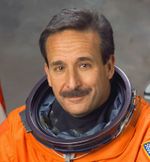
Charles Camarda, NASA’s Senior Advisor for Engineering Development
Charles Camarda was born in Queens, New York and received his undergraduate degree in Aerospace Engineering from the Polytechnic Institute of Brooklyn in 1974. Upon graduation, he began work at NASA’s Langley Research Center (LaRC), received his M.S. from GW in Mechanical Engineering in 1980 and a Ph.D. in Aerospace Engineering from VPI in 1990. He was Head of the Thermal Structures Branch at LaRC in 1996 when he was selected to be an Astronaut. He flew on the return-to-flight mission of Space Shuttle, STS-114, in 2005. He was selected Director of Engineering at JSC in December 2005, was the Deputy Director for Advanced Projects for NASA’s Engineering and Safety Center (NESC), NASA’s Senior Advisor for Innovation, and is currently NASA’s Senior Advisor for Engineering Development at NASA’s Langley Research Center.

Charles Pezeshki, School of MME Washington State University
Chuck is a pioneer in experiential learning and writes about the role of social connection, relationships and empathy in design thinking, neurological development, knowledge construction and information coherence. His blog/latest book is: http://empathy.guru/readers-guide
Ellen Lettvin, U.S. Department of Education
Dr. Ellen Lettvin is Senior Fellow at the U.S. Department of Education. She leads efforts that integrate STEM content and activities from several Federal agencies into program offerings for the nation’s largest out-of-school program and serves as liaison to the STEM Learning Ecosystems initiative. She previously served as Vice President for Science and Education at Pacific Science Center and as Assistant Director of the Applied Physics Laboratory at the University of Washington.
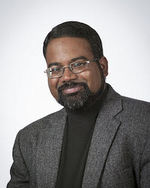
Krishna Madhavan, Associate Professor Purdue University
Krishna Madhavan is an associate professor of engineering education in the School of Engineering Education at Purdue University. He focuses on the research, design, and development of big data tools for a wide range of academic and nonacademic contexts.
Lee Rubenstein edX

Marc Nance, Director, Competitiveness & Integration, The Boeing Company
Marc has 30 years of experience with Boeing and has an extensive background in complex systems development projects and strategic planning. He led successful teams in the development of space and airborne systems that “connect and protect” our world. His strategic planning background includes complex systems planning and integration in a system-learning, multi-horizon environment. Marc also works with Dr Michael Richey as an executive sponsor of the AerosPACE program, which leverages complex, adaptive techniques with university students in the design, development and testing of aircraft design. http://www.boeing.com/features/2016/01/careers-students-01-16.page
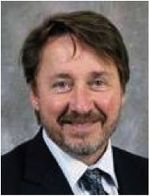
Michael Richey, Associate Technical Fellow, Boeing
Dr. Michael Richey is an Associate Technical Fellow currently assigned to support workforce development and learning science research at the Boeing Company. Dr. Richey is responsible for leading learning science research, including mapping the network structure of the engineering, technical and support workforce. His research encompasses, Complex Adaptive Systems, Learning Curves focusing on understanding the interplay between innovation, wealth creation, and economies of scale as they are manifested in questions of learning, evolvability, adaptability and sustainability. Additional responsibilities include providing business leadership for engineering technical and professional educational programs. This includes topics in systems engineering, advanced aircraft construction, composites structures and product lifecycle management. Michael is responsible for leading cross-organizational teams from academic, government focusing on how engineering education must acknowledge and incorporate this new information and knowledge to build new methodologies and paradigms that engage these developments in practice.

Rob Walbrun, Sr. Manager - Engineering Skills & Knowledge Management - Boeing Commercial Airlines
Robert Walbrun is a Sr. Manager in Boeing Commercial Airplanes Engineering. He is responsible for Engineering employee development through multiple training and employee coaching programs at Boeing.
Steve Holt, Associate Technical Fellow
Steven Holt is currently focused on the management of large scale, complex product development and production systems

Teniel Jones, Director (acting), Applies Learning Technologies and Innovation, Learning, Training and Development
Teniel Jones is currently an acting Director for the Applied Learning Technologies and Innovation (ALTI) organization within Learning Training and Development (LTD). Previously Teniel operated as the Senior Manager, leading the Strategic Technologies and Innovations Team in ALTI. In this role, Teniel is responsible for leading the technology management process; ensuring successful execution of the technology portfolio; leading the definition and implementation of a common learning strategy for Boeing and for developing an overarching learning technology architecture which meets both short- and long-term business partners’ needs. She holds a M.S. in Engineering Management from the University of Southern California; a B.S. in Industrial Engineering from California Polytechnic State University, San Luis Obispo; a Project Management Certificate from University of California, Irvine and a Leadership Certificate from University of California, Los Angeles. Teniel was a recipient of the 2007 Women of Color in Technology Rising Star Award, the Boeing Research and Technology 2010 Silver Team Award, 2013 Women of Color in STEM Technology All Star Award and 2014 Boeing HR-E Team Award.
Santa Fe Institute Participants
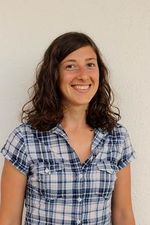
Caterina De Bacco, Postdoctoral Fellow, Santa Fe Institute
Caterina works with Professor Cris Moore on problems at the interface between computer science and statistical physics. Her research interests range from combinatorial optimization, inference, message passing and random walks on networks. She is interested in developing novel models and deriving fundamental limits to finding hidden structures behind noisy and incomplete datasets. Her approach combines Bayesian likelihood maximization with techniques borrowed from linear algebra such as low rank matrix approximation and non-negative tensor factorization. Applications range from clustering of sparse high dimensional data to community detection in networks with multiple types of edges. Starting from the theoretical findings, part of the challenge will be to develop efficient algorithmic ideas that are applicable to a broader range of problems and in different settings.

Gabby Beans, Manager of Online Education, Santa Fe Institute
Gabrielle came to Santa Fe in the Fall of 2013 and has settled in quickly, getting to know the local community, the hiking paths, and quirks of this beautiful city. She is excited to be at the helm of the Santa Fe Institute’s Complexity Explorer Online Education platform, helping to extend knowledge of complexity science worldwide. Previously she worked as a curriculum developer and facilitator with the Santa Fe Institute’s Project GUTS and was involved with the nationwide expansion of the middle school computational science program, in collaboration with Code.org. She also coordinated the Santa Fe Watershed Association’s Adopt the River program, getting the community involved with the restoration of the Santa Fe River.
Before coming to Santa Fe Gabrielle lived in New Zealand, where she carried out her doctoral research on the genetics of ancient and modern Adélie penguin populations at Massey University. Prior to that, she studied the evolution of pit viper phospholipase venom genes at the University of Wales in Bangor, and she received her undergraduate degree in Biology at the University of Alicante in Spain. She is half Spanish and half American and fully bilingual and is an avid photographer in her spare time.

Gwen Warniment, Inquiry Science Education Consortium Program Director, Los Alamos National Laboratory Foundation
A native New Mexican, Gwen has worked for the LANL Foundation since 2013, first as ISEC Director of Professional Development & Evaluation before becoming Program Director. However, she has been associated with the Inquiry Science Education Consortium since its inception in 2010, having previously worked as a Science Literacy Coach for Santa Fe Public Schools. Gwen is a doctoral candidate in Curriculum and Instruction at New Mexico State University. She has taught in Oaxaca, MX, and for the Santa Fe and Los Alamos Public Schools. Gwen also currently teaches graduate-level education classes for New Mexico Highlands University. A teacher at heart, she strives to integrate teaching and learning into a dynamic, creative process that serves to enrich both the individual and the community. She resides in Santa Fe and is constantly inspired by her two sons.
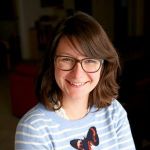
Juniper Lovato, Director of Education, Santa Fe Institute
Juniper Lovato has been a northern New Mexico resident her entire life. She currently works as the Director of Education at the Santa Fe Institute. At SFI she works across generations and geographical limits to make resources and knowledge on cutting edge complexity science more accessible to those with a hunger and curiosity for learning and exploration. Lovato received her Master’s Degree in the Western Classics from St. John’s College in 2013 where she completed a thesis on the nature of pleasure in Aristotle’s Nicomachean Ethics. She received a B.A. from the College of Santa in Business Administration and Political Science in 2009. Lovato likes to think of herself as an active community member. She holds Board positions at the Santa Fe Railyard Community Corporation, the Los Alamos National Laboratory Foundation, the Mandela International Magnet School, and is a member of the Santa Fe Public Education Department’s Digital Learning Advisory Committee. Juniper is also a founding member of MAKE Santa Fe, a new maker space in Santa Fe.
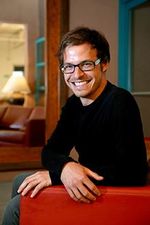
Laurent Hebert-Dufresne, JSMF Santa Fe Institute Postdoctoral Fellow
I earned my PhD in theoretical physics from Laval University in Québec where I got involved in network theory through a simple applied problem that resided on a complex canvas: disease propagation on social networks. This problem is in part simple; we have some intuition of how people interact and how diseases are transmitted. However, complexity stems not from the question itself, but from the fact that social networks, like most systems in nature, are greater than the sum of their parts. To understand disease propagation, we must not only understand how one individual infects another, but also the complex patterns that link these individuals to the rest of the population. Unfortunately, our current understanding is a patchwork: finding relevant network properties and including them, one at a time, in our existing mathematical models without a clear view of the larger design.
Using tools from statistical physics and other methods of mathematical modeling, my research attempts to find overarching principles that could lead to a more complete view of complex networks. I hope to find a better perspective to study networks than as an ensemble of points and lines. Switching our focus toward the systems that produce these networks, such as looking at the hierarchical structure of our society rather than at local social networks, I aim to find better ways to quantify the global role of each element in the systems. This implies adopting broader definitions of what networks can be; whereas most traditional methods simply construct them like puzzles, piece-by-piece based on limited information.
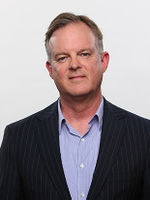
Marc Van Horne, Chief Online Learning Officer and Assistant Vice Presient, Arizona State University
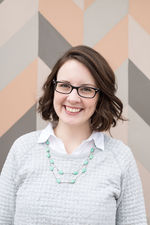
Nikki Pfarr, Design Researcher
Nikki Pfarr is a design researcher who specializes in helping product development teams combine insights from behavioral science with design thinking, to develop innovative products and services. She's supported innovation centers in companies like Google, Samsung, Microsoft, and T-Mobile, with an emphasis on projects related to education, healthcare, and productivity. Recent work has focused on the role of play in learning, incentive strategies to promote engagement in online programs, and how new technologies can enable social and emotional learning. Nikki received an SB in Comparative Media Studies from MIT, and an MDes from the IIT Institute of Design.
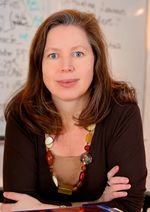
Paige Prescott, Doctorate student at the University of New Mexico in the Organization, Information and Learning Sciences department
Paige Prescott has been a classroom science teacher, a curriculum designer and is currently a doctorate student at the University of New Mexico in the Organization, Information and Learning Sciences department where she is interested in design experiences for both adults and students as they relate to learning computer science and computational thinking. She regularly conducts teacher professional development for teachers new to computer science and has helped to develop online supports for their continued professional growth.

Philippos Savvides, Arizona State University - EdPlus
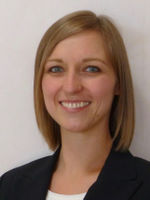
Suzanne Kern, Assistant Professor of Natural Sciences at Minerva Schools at KGI
Suzanne Kern is a biologist, chemist, teacher, and mentor with a longstanding interest in understanding and improving undergraduate science education. As an assistant professor at Minerva Schools at KGI, she teaches and develops curricula in the College of Natural Sciences. She earned her Ph.D. at MIT using interdisciplinary approaches to study bacterial metabolism, with implications for clinical medicine and bioenergy. Her interest in teaching and learning began during college and was fostered by student- and faculty-development programs in addition to her teaching experiences at Colorado College, MIT, Caltech, and the Claremont Colleges. Prior to joining Minerva in 2016, Suzanne taught biology at the W. M. Keck Science Department of the Claremont Colleges in California as a visiting assistant professor.

